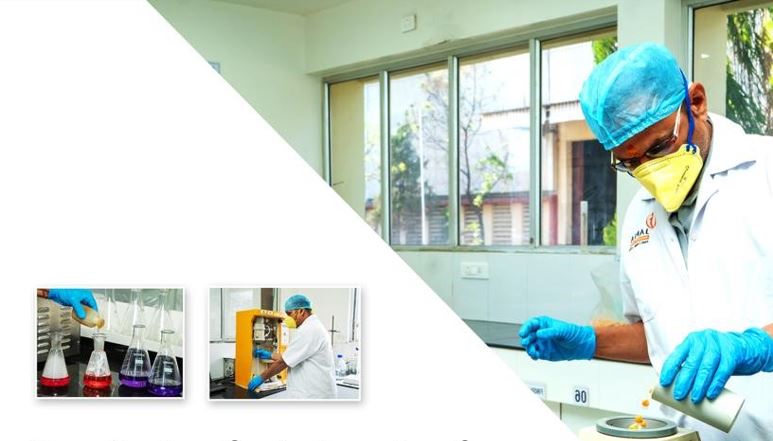JAPFA COMFEED INDIA PVT LTD, A subsidiary of JAPFA LTD, Singapore which is known as a leading provider of animal feed and Agri-Food products, announced the opening of its advanced testing laboratory. This state-of-the-art facility is dedicated to analysing animal feed and agricultural allied products, ensuring the highest standards of quality and safety for its customers.
One of the key highlights of this laboratory is its accreditation from the National Accreditation Board for Testing and Calibration Laboratories (NABL). NABL is an autonomous body under the Department of Science and Technology, Government of India, responsible for providing reliable and accurate testing and calibration services. The accreditation signifies that JAPFA COMFEED INDIA PVT LTD’s laboratory meets stringent international standards for testing competence and impartiality.
In addition to NABL accreditation, the laboratory holds certifications for ISO 9001, ISO 22000, and HACCP. ISO 9001 is an internationally recognized standard for quality management systems, ensuring that the laboratory operates efficiently and consistently delivers high-quality services. ISO 22000 focuses specifically on food safety management systems, guaranteeing that the laboratory adheres to rigorous protocols to prevent foodborne hazards.
Moreover, the laboratory has obtained HACCP certification, which stands for Hazard Analysis and Critical Control Points. HACCP is a systematic approach to identify, evaluate, and control hazards in food production processes. This certification further demonstrates JAPFA COMFEED INDIA PVT LTD’s commitment to ensuring the safety and integrity of its animal feed and agricultural products.
The new testing laboratory aims to provide JAPFA COMFEED INDIA PVT LTD’s customers with comprehensive and reliable testing services. Through cutting-edge equipment, highly trained personnel, and stringent quality control measures, the laboratory will analyze samples to assess their nutritional composition, contaminants, and overall quality. These tests will enable customers to make informed decisions about the animal feed and agricultural products they use, ensuring the health and productivity of their livestock and crops.
By establishing this advanced testing laboratory with NABL accreditation and certifications for ISO 9001, ISO 22000, and HACCP, JAPFA COMFEED India strengthens its position as a trusted provider of high-quality animal feed and agricultural products. The company remains committed to meeting the evolving needs of its customers and upholding the highest standards of quality and safety in the industry.
As per Mr Manish Patil , Head of Laboratory and Quality assurance , Japfa India following will be the benefits for Animal feed manufacturers and Agri farmers :
- Quality Control: A feed testing laboratory helps ensure the quality and safety of animal feed. It analyses samples to determine nutritional content, detect contaminants, and assess overall feed composition. This information is crucial for maintaining consistent feed quality and preventing issues that could impact animal health.
- Nutritional Analysis: Feed testing laboratories provide detailed nutritional analysis of feed samples. They can determine the levels of various nutrients, such as proteins, carbohydrates, fats, vitamins, and minerals. This information allows farmers and feed manufacturers to assess the nutritional adequacy of their feed formulations and make any necessary adjustments to optimize animal performance.
- Formulation Optimization: By analyzing feed samples, a testing laboratory can provide valuable feedback to farmers and feed manufacturers on the nutritional composition of their feed. This data helps optimize feed formulations to ensure they meet the specific dietary needs of different animal species and production stages, leading to improved animal health, growth, and productivity.
- Contaminant Detection: Feed testing laboratories can identify the presence of contaminants in animal feed, including mycotoxins, heavy metals, pesticides, and other harmful substances. Detecting and quantifying these contaminants is crucial for preventing their ingestion by animals, which can lead to health problems, reduced performance, or even food safety issues if the contaminated feed enters the human food chain.
- Compliance with Regulations: Animal feed production is subject to various regulations and standards related to quality, safety, and labeling requirements. Feed testing laboratories help ensure compliance with these regulations by conducting analyses that confirm the feed meets the specified standards. This assists feed manufacturers in avoiding legal issues, maintaining customer trust, and meeting market demands.
- Research and Development: Feed testing laboratories contribute to research and development efforts within the animal nutrition field. By conducting analyses, collecting data, and studying feed samples, they help advance scientific knowledge and understanding of animal nutrition. This information can be used to develop innovative feed formulations, improve feeding practices, and enhance animal health and productivity.
- Troubleshooting and Problem Solving: When issues arise related to animal health, growth, or performance, feed testing laboratories can play a vital role in identifying potential causes. By analyzing feed samples and comparing them with nutritional requirements, they can help diagnose feed-related problems, such as nutrient deficiencies or imbalances. This enables prompt corrective actions and prevents further losses.
Overall, feed testing laboratories provide critical services that contribute to the production of safe, high-quality animal feed, optimized animal nutrition, and improved animal health and productivity. They are indispensable for farmers, feed manufacturers, researchers, and regulatory bodies in ensuring the well-being of animals and the success of the agricultural and livestock industries.





